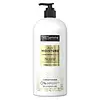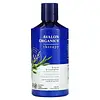What's inside
What's inside
 Key Ingredients
Key Ingredients

 Benefits
Benefits

 Concerns
Concerns

 Ingredients Side-by-side
Ingredients Side-by-side

Water
Skin ConditioningCetearyl Alcohol
EmollientDimethicone
EmollientStearamidopropyl Dimethylamine
EmulsifyingBehentrimonium Chloride
PreservativeTocopheryl Acetate
AntioxidantAscorbic Acid
AntioxidantPanthenol
Skin ConditioningBiotin
AntiseborrhoeicNiacinamide
SmoothingParfum
MaskingDipropylene Glycol
HumectantLactic Acid
BufferingAmodimethicone
Sodium Chloride
MaskingDisodium EDTA
PEG-7 Propylheptyl Ether
Emulsion StabilisingCetrimonium Chloride
AntimicrobialMethylchloroisothiazolinone
PreservativeMethylisothiazolinone
PreservativeAmyl Cinnamal
PerfumingLimonene
PerfumingLinalool
PerfumingWater, Cetearyl Alcohol, Dimethicone, Stearamidopropyl Dimethylamine, Behentrimonium Chloride, Tocopheryl Acetate, Ascorbic Acid, Panthenol, Biotin, Niacinamide, Parfum, Dipropylene Glycol, Lactic Acid, Amodimethicone, Sodium Chloride, Disodium EDTA, PEG-7 Propylheptyl Ether, Cetrimonium Chloride, Methylchloroisothiazolinone, Methylisothiazolinone, Amyl Cinnamal, Limonene, Linalool
Aloe Barbadensis Leaf Juice
Skin ConditioningWater
Skin ConditioningBrassica Alcohol
EmollientGlycerin
HumectantCocos Nucifera Oil
MaskingBrassicyl Isoleucinate Esylate
Emulsion StabilisingCapryloyl Glycerin/Sebacic Acid Copolymer
Skin ConditioningCedrus Atlantica Bark Oil
MaskingCitrus Aurantifolia Oil
CleansingCitrus Aurantium Dulcis Peel Oil
MaskingCitrus Limon Peel Oil
MaskingCitrus Paradisi Peel Oil
MaskingEucalyptus Globulus Leaf Oil
PerfumingJuniperus Virginiana Oil
MaskingPersea Gratissima Oil
Skin ConditioningRosmarinus Officinalis Leaf Oil
MaskingZingiber Officinale Root Oil
MaskingAvena Sativa Kernel Extract
AbrasiveCalendula Officinalis Flower Extract
MaskingChamomilla Recutita Flower Extract
MaskingChenopodium Quinoa Seed
AbrasiveCitrus Aurantium Dulcis Fruit Extract
MaskingCitrus Grandis Fruit Extract
AstringentDaucus Carota Sativa Root Extract
Skin ConditioningLavandula Angustifolia Flower/Leaf/Stem Extract
MaskingPersea Gratissima Fruit Extract
EmollientRubus Idaeus Fruit Extract
AstringentSolanum Lycopersicum Fruit/Leaf/Stem Extract
AstringentBiotin
AntiseborrhoeicNiacinamide
SmoothingPanthenol
Skin ConditioningTocopheryl Acetate
AntioxidantGlyceryl Stearate
EmollientStearyl Alcohol
EmollientGluconolactone
Skin ConditioningSodium Benzoate
MaskingCitral
PerfumingLimonene
PerfumingAloe Barbadensis Leaf Juice, Water, Brassica Alcohol, Glycerin, Cocos Nucifera Oil, Brassicyl Isoleucinate Esylate, Capryloyl Glycerin/Sebacic Acid Copolymer, Cedrus Atlantica Bark Oil, Citrus Aurantifolia Oil, Citrus Aurantium Dulcis Peel Oil, Citrus Limon Peel Oil, Citrus Paradisi Peel Oil, Eucalyptus Globulus Leaf Oil, Juniperus Virginiana Oil, Persea Gratissima Oil, Rosmarinus Officinalis Leaf Oil, Zingiber Officinale Root Oil, Avena Sativa Kernel Extract, Calendula Officinalis Flower Extract, Chamomilla Recutita Flower Extract, Chenopodium Quinoa Seed, Citrus Aurantium Dulcis Fruit Extract, Citrus Grandis Fruit Extract, Daucus Carota Sativa Root Extract, Lavandula Angustifolia Flower/Leaf/Stem Extract, Persea Gratissima Fruit Extract, Rubus Idaeus Fruit Extract, Solanum Lycopersicum Fruit/Leaf/Stem Extract, Biotin, Niacinamide, Panthenol, Tocopheryl Acetate, Glyceryl Stearate, Stearyl Alcohol, Gluconolactone, Sodium Benzoate, Citral, Limonene
Ingredients Explained
These ingredients are found in both products.
Ingredients higher up in an ingredient list are typically present in a larger amount.
Biotin is a B vitamin that is naturally produced by our bodies. It is also called Vitamin H.
Our bodies use biotin in the metabolism process. It also helps our bodies use enzymes and move nutrients around. A biotin deficiency can lead to brittle hair and nails.
More research is needed on applying biotin topically. However, taking biotin orally has been shown to help nourish the skin, hair, and nails. They play a role in forming skin-hydrating fatty acids.
Biotin is water-soluble. It can be found in foods such as fish, eggs, dairy, nuts, and meat. Vitamin H stands for "haar" and "haut". These are the German words for hair and skin.
Learn more about BiotinLimonene is a fragrance that adds scent and taste to a formulation.
It's found in the peel oil of citrus fruits and other plants such as lavender and eucalyptus. The scent of limonene is generally described as "sweet citrus".
Limonene acts as an antioxidant, meaning it helps neutralize free radicals.
When exposed to air, oxidized limonene may sensitize the skin. Because of this, limonene is often avoided by people with sensitive skin.
The term 'fragrance' is not regulated in many countries. In many cases, it is up to the brand to define this term. For instance, many brands choose to label themselves as "fragrance-free" because they are not using synthetic fragrances. However, their products may still contain ingredients such as essential oils that are considered a fragrance.
Learn more about LimoneneNiacinamide is a multitasking form of vitamin B3 that strengthens the skin barrier, reduces pores and dark spots, regulates oil, and improves signs of aging.
And the best part? It's gentle and well-tolerated by most skin types, including sensitive and reactive skin.
You might have heard of "niacin flush", or the reddening of skin that causes itchiness. Niacinamide has not been found to cause this.
In very rare cases, some individuals may not be able to tolerate niacinamide at all or experience an allergic reaction to it.
If you are experiencing flaking, irritation, and dryness with this ingredient, be sure to double check all your products as this ingredient can be found in all categories of skincare.
When incorporating niacinamide into your routine, look out for concentration amounts. Typically, 5% niacinamide provides benefits such as fading dark spots. However, if you have sensitive skin, it is better to begin with a smaller concentration.
When you apply niacinamide to your skin, your body converts it into nicotinamide adenine dinucleotide (NAD). NAD is an essential coenzyme that is already found in your cells as "fuel" and powers countless biological processes.
In your skin, NAD helps repair cell damage, produce new healthy cells, support collagen production, strengthen the skin barrier, and fight environmental stressors (like UV and pollution).
Our natural NAD levels start to decline with age, leading to slower skin repair, visible aging, and a weaker skin barrier. By providing your skin niacinamide, you're recharging your skin's NAD levels. This leads to stronger, healthier, and younger looking skin.
Another name for vitamin B3 is nicotinamide. This vitamin is water-soluble and our bodies don't store it. We obtain Vitamin B3 from either food or skincare. Meat, fish, wheat, yeast, and leafy greens contain vitamin B3.
The type of niacinamide used in skincare is synthetically created.
Learn more about NiacinamidePanthenol is a common ingredient that helps hydrate and soothe the skin. It is found naturally in our skin and hair.
There are two forms of panthenol: D and L.
D-panthenol is also known as dexpanthenol. Most cosmetics use dexpanthenol or a mixture of D and L-panthenol.
Panthenol is famous due to its ability to go deeper into the skin's layers. Using this ingredient has numerous pros (and no cons):
Like hyaluronic acid, panthenol is a humectant. Humectants are able to bind and hold large amounts of water to keep skin hydrated.
This ingredient works well for wound healing. It works by increasing tissue in the wound and helps close open wounds.
Once oxidized, panthenol converts to pantothenic acid. Panthothenic acid is found in all living cells.
This ingredient is also referred to as pro-vitamin B5.
Learn more about PanthenolTocopheryl Acetate is AKA Vitamin E. It is an antioxidant and protects your skin from free radicals. Free radicals damage the skin by breaking down collagen.
One study found using Tocopheryl Acetate with Vitamin C decreased the number of sunburned cells.
Tocopheryl Acetate is commonly found in both skincare and dietary supplements.
Learn more about Tocopheryl AcetateWater. It's the most common cosmetic ingredient of all. You'll usually see it at the top of ingredient lists, meaning that it makes up the largest part of the product.
So why is it so popular? Water most often acts as a solvent - this means that it helps dissolve other ingredients into the formulation.
You'll also recognize water as that liquid we all need to stay alive. If you see this, drink a glass of water. Stay hydrated!
Learn more about Water